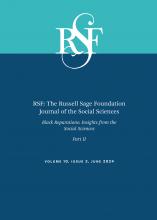Abstract
In March 2021, the city council in Evanston, Illinois, began distributing reparations funds to Black residents in the form of $25,000 housing grants. In doing so, Evanston became the first city in the United States to provide publicly funded reparations to Black people for generations of racist policies, including redlining. Why did the reparations program first emerge in Evanston? This article provides an in-depth look at the politics of the policy design process and describes the unique political circumstances that allowed this historic policy to pass with near-unanimous support. As communities throughout the United States consider how to deliver reparations to Black Americans, the debate over Evanston’s ordinance serves as a cautionary tale for how ambitious historic policies may become watered down when political expedience trumps the political insights of Black residents.
- © 2024 Russell Sage Foundation. Newton, Monique, and Matthew D. Nelsen. 2024. “The Politics of Expedience: Evanston, Illinois, and the Fight for Reparations.” RSF: The Russell Sage Foundation Journal of the Social Sciences 10(3): 114–39. https://doi.org/10.7758/RSF.2024.10.3.06. Direct correspondence to: Monique Newton, at mnewton{at}u.northwestern.edu, 601 University Place, Evanston, Illinois 60208, United States
Open Access Policy: RSF: The Russell Sage Foundation Journal of the Social Sciences is an open access journal. This article is published under a Creative Commons Attribution-NonCommercial-NoDerivs 3.0 Unported License.






